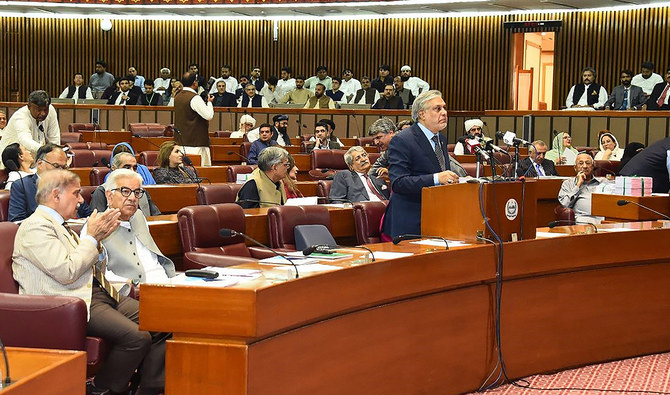ISLAMABAD: Pakistan kicked off its 33-day-long Hajj flight operation on Tuesday, the Pakistan Airports Authority (PAA) said, with flights departing from Islamabad, Lahore, Karachi and Quetta for the Saudi city of Madinah.
Over 89,000 pilgrims will travel under the government’s scheme during Pakistan’s Hajj flight operations. They will travel to Makkah and Madinah via 342 flights in total, with the last one departing from Pakistan on May 31.
The first Hajj flight for this year, Pakistan International Airlines’ PK-713, departed under the Route to Makkah Initiative from Islamabad at 4:45am, carrying 442 pilgrims. The second flight left the eastern Pakistani city of Lahore at 8:30am, with 147 pilgrims aboard, according to the PAA. The third flight left Quetta with 151 pilgrims and the fourth from Karachi, carrying 285 pilgrims.
Religious Affairs Minister Sardar Muhammad Yousaf and Saudi Ambassador to Pakistan Nawaf bin Said Al-Malki bid farewell to the pilgrims in Islamabad. Yousaf advised Pakistani pilgrims to strictly adhere to Saudi Arabia’s laws and respect the local culture during the annual Islamic pilgrimage and said he would “soon” travel to Saudi Arabia to review Hajj arrangements.
“As Hajj pilgrims, you are traveling to the sacred land as the guests of Allah and ambassadors of Pakistan, and you are urged to respect the laws and culture of Saudi Arabia,” the minister said in a televised address.
“I will take every possible measure to resolve the issues faced by Pakistani pilgrims in Saudi Arabia and will personally be among them to provide facilities.”
The Makkah Route Initiative is designed to streamline immigration processes by enabling pilgrims to complete official travel formalities at their departure airports. Initially tested in Islamabad in 2019, the program was later expanded to Karachi, benefitting tens of thousands of Pakistani travelers. This saves pilgrims several hours upon arrival in the Kingdom, as they can simply enter the country without having to go through immigration again.
Around 50,500 Pakistani pilgrims will travel to Saudi Arabia under the initiative this year. The scheme was launched in 2019 by the Saudi Ministry of Hajj and Umrah and has been implemented in five countries: Pakistan, Malaysia, Indonesia, Morocco and Bangladesh.
A total of 28,400 pilgrims will leave for Saudi Arabia through 100 flights from the Islamabad airport, Pakistan’s religious affairs ministry said. Seven special immigration counters have been set up at the Islamabad airport to facilitate pilgrims under the Makkah Route Initiative. The remaining 22,500 pilgrims will avail the scheme at the Jinnah International Airport in Karachi.
This year’s annual pilgrimage will take place in June.
In Karachi, the departure ceremony was attended by Saudi Arabia’s Consul General Muhammad bin Nasser Al-Subaie, representatives from the Ministry of Religious Affairs, and senior officials from various airport agencies.
“Special arrangements were made at the airport for the pilgrims, including dedicated check-in counters, guidance services, and improved facilities to ensure a smooth and comfortable travel experience,” the PAA said.
“Officials extended their best wishes to the pilgrims for a safe and spiritually fulfilling journey. The Saudi consul general praised the excellent coordination and arrangements made for Hajj operations.”
Punjab Minister for Specialized Healthcare Khawaja Salman Rafique and Balochistan Governor Sheikh Jaffar Mandokhail attended departure ceremonies in Lahore and Quetta, respectively.
Rafique appreciated efforts of the PAA and all concerned departments in ensuring a smooth conduct of Hajj operations and extended his heartfelt wishes to the pilgrims for a safe and peaceful journey.
Balochistan Director Hajj Ilyas Jaffar and representatives of other agencies were present alongside Balochistan Governor Mandokhail at the departure ceremony in Quetta.
“The Honourable governor and other dignitaries requested special prayers for the prosperity of Pakistan and the continued success of all institutions,” the PAA said.
















